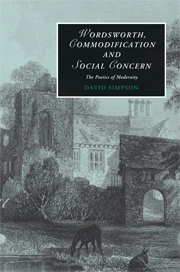Wordsworth, Commodification, and Social Concern
This reading of Wordworth's poetry by leading critic David Simpson centres on its almost obsessive representation of spectral forms and images of death in life. Wordsworth is reacting, Simpson argues, to the massive changes in the condition of England and the modern world at the turn of the century: mass warfare; the increased scope of machine-driven labour and urbanisation; and the expanding power of commodity form in rendering economic and social exchange more and more abstract, more and more distant from human agency and control. Reading Wordsworth alongside Marx and Derrida, Simpson examines the genesis of an attitude of concern which exemplifies the predicament of modern subjectivity as it faces suffering and distress.
- Major book on Wordsworth by leading critic David Simpson
- Reading of Wordsworth's poetry focusing on the link between poetic rhetoric and socio-historical development
- Careful reading of Wordsworth alongside Marx and Derrida showing links between poetry and the conditions of modernity
Reviews & endorsements
"David Simpson pursues an elegant thesis: Wordsworth's writing is haunted by specters and automatons because it records the early stages of modernity as shaped by the 'ghostly' work of the commodity form... Other critics have written about Wordsworth and modernity, and Romanticists will note quick, dense treatments of subjects such as time, 'thing theory,' and wartime displacement that have received more extensive discussion elsewhere. This does not diminish the value of the clarity and range of theoretical exposition here or of Simpson's sharp, economical descriptions of the state of modernity... Most admirably, the book demonstrates that political and historical criticism can be evaluative, even appreciative. Simpson reminds us that Wordsworth’s poetry remains urgent, not only because of what it may tell us about his modernity and our own but because, as this dazzling series of analyses shows, what is unsaid and undone--what is unsayable and undoable--remains both spectral and present there."
-Brian Goldberg, Modern Language Quarterly March 2012
Product details
April 2009Adobe eBook Reader
9780511501197
0 pages
0kg
This ISBN is for an eBook version which is distributed on our behalf by a third party.
Table of Contents
- Introduction
- 1. At the limits of sympathy
- 2. At home with homelessness
- 3. Figures in the mist
- 4. Timing modernity: around 1800
- 5. The ghostliness of things
- 6. Living images, still lives
- 7. The scene of reading.


